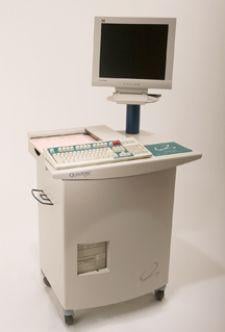
Quinton's Q-Stress for high-performance, hospital-grade stress testing.
The three hospitals of the Valley Health system in northwestern Virginia have improved the quality and efficiency of cardiac care by installing Cardiac Science’s Pyramis system to manage data from its diagnostic cardiology devices and to integrate this data with central admission, order and billing systems. Valley Health relies on Cardiac Science’s Quinton Eclipse Premier ECGs, Vision Premier Holter and Q-Stress Stress systems.
Valley Health — named one of the 100 Most Wired Hospitals in the U. S. in 2006 — operates three facilities in northwestern Virginia. The 411-bed Winchester Medical Center in Winchester performs all of the system’s cardiac surgeries, interventional and other catheterization procedures; Warren Memorial Hospital in Front Royal has 196 beds; and Shenandoah Memorial Hospital in Woodstock is a 25-bed critical access hospital. Winchester Medical Center alone performs approximately 43,000 ECGs every year, as well as approximately 500 open heart surgeries. Last year, Winchester performed 4,500 cardiac catheterization procedures and 1,600 interventional procedures.
Hoping to tie all of its facilities into a central data management system, Valley Health installed Pyramis in 2005, connecting its Quinton ECG, Holter and stress devices with its hospital information system, improving the efficiency of its cardiology team and the quality of patient care across its network of facilities.
Why Pyramis?
“We had installed our previous ECG data system in 1991 and it badly needed an upgrade,” explained Sonya Gregg, corporate director of Non-Invasive Cardiovascular Services. “If a patient had an ECG at another site, we were still faxing those reports to Winchester; faxes would get lost and poor fax quality made it less than optimal for physicians to interpret the ECG.”
“We wanted to upgrade the central data management system but we also wanted it to tie all of our devices at all three facilities together,” said Gregg. “If we want to deliver the same quality of care to patients regardless of which facility they visit, the medical staff at each facility needs access to all of the pertinent records, regardless of where the data was collected.
“Because our ECG carts need to move around our facilities, wireless capability was very important,” she continued. “Our physicians needed to have access to patient data online, and to interpret, as well as sign, the ECGs electronically. And all of our historical ECG data had to be migrated to the new system.”
Valley Health looked at several vendors over the course of a year.
Pyramis satisfied all of these requirements. Upon installation it worked seamlessly with Valley Health’s HL7 interface, which ties its Eclipse Premier ECGs, Vision Premier Holter and Q-Stress stress systems into the orders system, admissions, billing and the physician portal. It accepted all of the previous system’s historical data and tagged each record to identify its facility of origin.
So now when a patient’s info is gathered at admission, it automatically feeds into Pyramis as needed. When a doctor orders an ECG or stress test, the order system pings Pyramis, which populates the device with the patient’s admission information. The data from the test flows back into to ECG data management, which the cardiologist can view online, and informs the accounting system, which adds the test to the patient’s bill.
Connectivity Saves Lives
“When a patient retuned his Holter monitor to our critical access hospital, the staff downloaded the data into Pyramis right away,” said Cindy Guerin, Valley Health’s cardiovascular system administrator. “At Winchester Medical Center, nearly 35 miles away, we were able to view the data and detect a significant abnormality before the patient was discharged. We had the patient transferred to Winchester immediately and implanted a pacemaker within hours, very likely saving the patient’s life. This is the value of advanced connectivity.”
Pyramis has also played a critical role in the reduction of Valley Health’s “door to balloon time,” an important measure of quality and efficient care.
“With wireless connectivity to Pyramis on all of our ECG carts, a patient who presents with symptoms of heart disease can walk into any of our three emergency departments and have his or her ECG data flow seamlessly into our centralized data management system in Winchester,” explained Gregg. “The physicians interpret the data in real time. So if an emergency intervention is needed, the surgery suite or cath lab at Winchester Medical Center can be set up while the patient is en route, which eliminates needless down time for the patient and speeds the delivery of a potentially life saving therapy.”
“Cardiac Science’s products are excellent, and the support and service they provide us is outstanding,” said Guerin. “Cardiac Science stands by its product and is true to its word. If we have a problem with the wireless units on our ECG carts or the HL7 interface, they don’t stop until they find the answer. I can always make immediate contact with our support rep and he can usually identify and correct the problem while I am on the phone or within the hour.”



 January 29, 2020
January 29, 2020 



